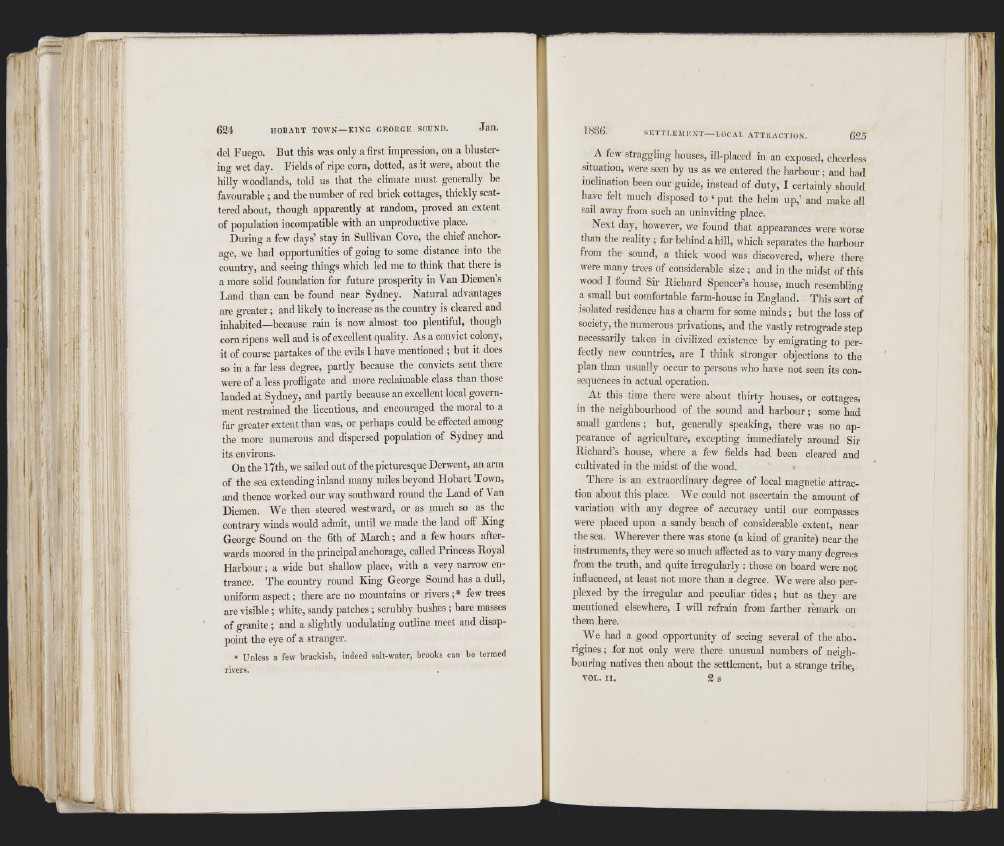
li ; ri
del Fuego. But this was only a first impression, on a blustering
wet day. Fields of ripe corn, dotted, as it were, about the
hilly woodlands, told us that the climate must generally he
favourable ; and the number of red brick cottages, thickly scattered
about, though apparently at random, proved an extent
of population incompatible with an unproductive place.
During a few days’ stay in Sullivan Cove, the chief anchorage,
we had opportunities of going to some distance into the
country, and seeing things which led me to think that there is
a more solid foundation for future prosperity in Van Diemen’s
Land than can he found near Sydney. Natural advantages
are greater; and likely to increase as the country is cleared and
inhabited—because rain is now almost too plentiful, though
corn ripens well and is of excellent quality. As a convict colony,
it of course partakes of the evils I have mentioned ; but it does
so in a far less degree, partly because the convicts sent there
were of a less profligate and more reclaimable class than those
landed at Sydney, and partly because an excellent local government
restrained the licentious, and encouraged the moral to a
far greater extent than was, or perhaps could be effected among
the more numerous and dispersed population of Sydney and
its environs.
On the 17th, we sailed out of the picturesque Derwent, an arm
of the sea extending inland many miles beyond Hobart Town,
and thence worked our way southward round the Land of Van
Diemen. We then steered westward, or as much so as the
contrary winds would admit, until we made the land off King
George Sound on the 6th of March; and a few hours afterwards
moored in the principal anchorage, called Princess Royal
Harbour; a wide but shallow place, with a very narrow entrance.
The country round King George Sound has a dull,
uniform aspect; there are no mountains or rivers ;* few trees
are visible ; white, sandy patches ; scrubby bushes ; bare masses
of granite ; and a slightly undulating outline meet and disappoint
the eye of a stranger.
» Unless a few brackish, indeed salt-water, brooks can be termed
A few straggling houses, ill-placed in an exposed, cheerless
situation, were seen by us as we entered the harbour ; and had
inclination been our guide, instead of duty, 1 certainly should
have felt much disposed to ‘ put the helm up,’ and make all
sail away from such an uninviting place.
Next day, however, we found that appearances were worse
than the reality; for behind a hill, which separates the harbour
from the sound, a thick wood was discovered, where there
were many trees of considerable size; and in the midst of this
wood I found Sir Richard Spencer’s house, much resembling
a small but comfortable farm-house in Lngland. This sort of
isolated residence has a charm for some minds; but the loss of
society, the numerous privations, and the vastly retrograde step
necessarily taken in civilized existence by emigrating to perfectly
new countries, are I think stronger objections to the
plan than usually occur to persons who have not seen its consequences
in actual operation.
At this time there were about thirty houses, or cottages,
in the neighbourhood of the sound and harbour; some had
small gardens ; but, generally speaking, there was no appearance
of agriculture, excepting immediately around Sir
Richard’s house, where a few fields had been cleared and
cultivated in the midst of the wood. i
There is an extraordinary degree of local magnetic attraction
about this place. We could not ascertain the amount of
variation with any degree of accuracy until our compasses
were placed upon a sandy beach of considerable extent, near
the sea. Wherever there was stone (a kind of granite) near the
instruments, they were so much affected as to vary many degrees
from the truth, and quite irregularly : those on hoard were not
influenced, at least not more than a degree. We were also perplexed
by the irregular and peculiar tides; but as they are
mentioned elsewhere, I will refrain from farther remark on
them here.
We had a good opportunity of seeing several of the aborigines
; for not only were there unusual numbers of neighbouring
natives then about the settlement, but a strange tribe,
VOL. I I . 2 s
I
" i i
i{i "
ilH
— ;